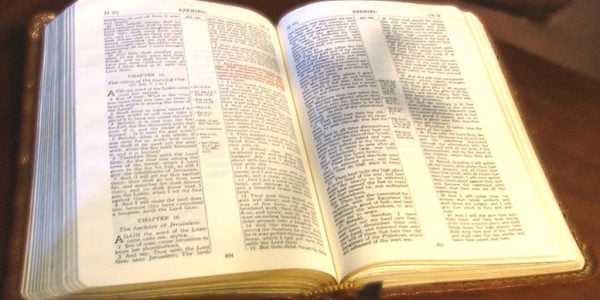
The signers of the Declaration of Independence were not biblical inerrantists. If they had been, they would have had to contend with Romans 13:1 which says “all authorities that exist have been instituted by God.” And they would have been forced to frame the grievances of their Declaration to justify their disobedience of Romans 13.
For John Calvin and his inerrantist minions, there was only one reason that rebelling against an established government was permissible: if obeying God required disobeying the established government. This was of course the polemical ground upon which Calvin built his argument for rebelling against the Roman Catholic Church. But this argument is nowhere to be found in the many grievances the English colonists list against King George III as justification for their rebellion. Their argument was a deist, rationalist argument. God was only relevant to them as a figurehead who endowed the rights of life, liberty, and the pursuit of happiness.
Does this mean that the American Revolution was biblically unjustifiable? John Wesley certainly believed so. He wrote a pamphlet denouncing it, entitled “A Calm Address to Our American Colonies,” where he says:
Ten times over, in different words, you “profess yourselves to be contending for liberty.” But it is a vain, empty profession: unless you mean by that threadbare word, a liberty from obeying your rightful sovereign, and from keeping the fundamental laws of your country. And this undoubtedly it is, which the confederated colonies are now contending for.
Not just the rebellion of the American colonies, but even the development of European democracy as such was a rebellion against Romans 13. Ask any of the Catholic kings of Europe or their many theologians who polemicized in favor of divinely appointed monarchy. I’ve read some of their biblically supported arguments against democracy. But that doesn’t stop white Christian oligarchs today who love their biblical inerrancy and their 18th century founding fathers about equally from using Romans 13 to denounce any protest against injustice by authority figures.
What’s so ironic is that Paul wrote Romans 13 primarily to tell the early Christians to pay their taxes (Romans 13:6-7). That’s his main point. But now the Christians who love to talk about authority and obedience (as long as they’re the authorities to be obeyed) have decided that they hate paying their taxes to the government since the civil rights movement compelled the government to serve people who aren’t white. Conservatism is not opposed to centralized power by nature. For most of history in most societies, it has been monarchical. Only in the racial environment of the United States could “conservatism” have taken the opportunistically libertarian shape it has during the past four decades of backlash against the civil rights movement.
That’s why the Tea Party is perfectly compatible with Romans 13, while Black Lives Matter is not. Because it’s unimaginable for the authority of our nation’s first black president to be “instituted by God,” but any white man with a badge and a gun is an “authority who must not be resisted” (Romans 13:2). A black president who quotes scripture cogently is a secret Muslim. A white president who proudly declares his lack of need for God’s mercy is the Cyrus who has come to save the poor persecuted white Christians.
So what do I think of Romans 13? It is probably the passage that I would come closest to throwing out of the canon, to be honest. I hope the apostle Paul knelt before Philando Castile when he arrived in heaven to beg his forgiveness for having written, “Do you wish to have no fear of the authority? Then do what is good, and you will receive its approval; for it is God’s servant for your good” (Romans 13:3-4). Maybe it works that way for white people just like it worked that way for Roman citizens like Paul back in the day. But it didn’t work that way for Castile, who did exactly what he was instructed to do and got murdered by a cop anyway.
What I absolutely agree with is the place where Paul ends up in Romans 13:7: “Pay to all what is due them—taxes to whom taxes are due, revenue to whom revenue is due, respect to whom respect is due, honor to whom honor is due.” Christians need to be people of honor and integrity in our interactions with all the people and institutions of the world, however corrupt they may be. We cannot segregate ourselves into gated communities of privilege who wash our hands of the common good.
But the other thing I need to add is that what Christian authority looks like is Jesus dying helplessly on the cross. It is on the cross that Jesus has the authority God chooses. In the book of Revelation, it is a slaughtered lamb before whom the multitudes prostrate themselves. By representing himself to us in this way, God confers his authority upon those whom we marginalize and crucify. Romans 13 was written by and for the persecuted. It was not written to people who are in power as a means of validating their power. So the best way for Christians who have power and privilege today to honor Romans 13 is to prostrate ourselves before those who are being crucified and marginalized in our world.
Check out my book How Jesus Saves the World From Us!
Please help our campus ministry empower marginalized college students by becoming a monthly patron!












